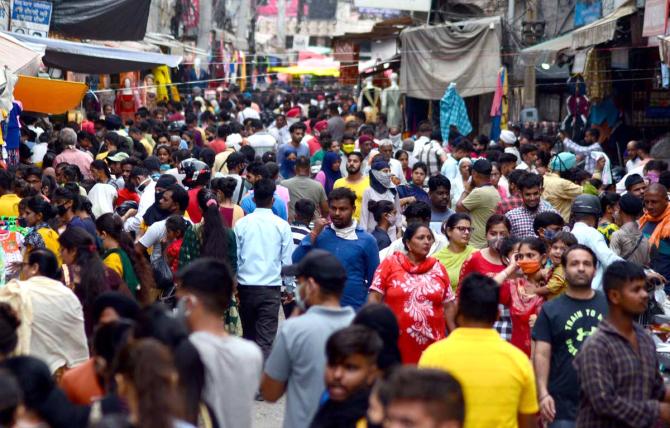'People have developed a fatalistic attitude where they believe that anything can happen. They think, 'there's no medicine, no beds in the hospitals, what are we alive for?' And when you get that kind of an attitude, you stop taking precautions'

Why? As thousands crowd into markets, public places and holiday destinations seemingly without thought for the devastating second wave India is barely out of or the possibility of a third anytime, that is the question experts are pondering.
It's a combination of apathy and a certain fatalistic attitude, said senior epidemiologist Lalit Kant. Attempting to decode the ‘no mask-no social distancing' recklessness underlining societal behaviour, psychiatrist Nimish Desai added that the public is unable to see the risks and correlate the restrictions on them.
India, Desai said, has seen “heavy trends of social irresponsibility”.
Concerns have mounted after images on social and other media of snaking queues of cars waiting to enter hill stations and of people so anxious to get their lives back on track that basic precautions have been given the go by as they throng vacation spots and leisure sites.
“In all cultures what should have happened is what is called risk perception -- how much does a society perceive the threat (to be) and how much does it modify its behaviour accordingly,” Desai, director of the Institute of Human Behaviour and Allied Sciences, told PTI.
While the pandemic is primarily a health crisis, experts say the role of a society in controlling or fanning a contagion cannot be overlooked.
“The public in their conscious or unconscious minds could not see and correlate the restrictions on them…,” Desai said, referring to the peak of the first wave during the festive season last year.
Around the Diwali-Durga Puja season, people seemed to be over-compensating for the time they spent confined in their homes, he said.
This unlock doesn't seem very different.
The seeming return to normalcy as India's Covid numbers dip is comforting. But the scenes of people not adhering to basic Covid protocols are also alarmingly familiar -- that's exactly what happened when the first wave was ebbing only to make way for a ferocious second one.
“People's compliance to guidance for adopting Covid appropriate behaviour has influenced the course the pandemic would take -- slowing or accelerating it,” Kant, former head of the Epidemiology and Communicable Diseases Division at the Indian Council of Medical Research, told PTI.
According to the senior epidemiologist, the non-adoption of Covid appropriate behaviour (CAB) is part of the reason for the second wave. Social distancing already seems a thing of the past, and double masks are on their way out, as single ones resume their ‘chin position'.
India's Covid death toll crossed the 4 lakh mark earlier this month. Of this, nearly 60 per cent was during the second wave, the Union health ministry has said.
Trying to understand why it is difficult for people to do the basic of wearing masks properly, maintaining hand hygiene or just keeping distance, Kant said a fatalistic attitude discourages them from considering “non-pharmaceutical interventions”.
"To my mind it is general apathy. It is not that they are against it, they understand that it is important, but they just don't care.
“People have developed a fatalistic attitude where they believe that anything can happen. They think, 'there's no medicine, no beds in the hospitals, what are we alive for?' And when you get that kind of an attitude, you stop taking precautions,” he said.
Societies higher in openness and extraversion (an indicator of how much of an extrovert a person is) showed that people did not stay confined to their homes even after restrictions were announced on their movement, he said.
“Studies have shown that extraverts are especially prone to defying short term instructions or regulations exhibiting perhaps more counter-compliant behaviour.”
The increasing number of Indians violating Covid norms seems to bear his assertion out.
According to Delhi government data, for instance, over 87,000 people were fined in a matter of three weeks last month.
"Sustained mass level behaviour change is difficult but also not impossible,” Desai explained.
Often, governments and administrations attempting to modify people's behaviour at a mass level rely on Behaviour Change Communication (BCC).
Effective BCC strategies comprise repetitive messages that are simple to understand and often illustrative, and the benefits of which should be evident.
“In the last two decades, developed countries have somewhat understood that every individual's health status depends on their lifestyle and behaviour. This itself was lacking in our society. Now the realisation in the world community is and should be that our collective health status depends on our collective behaviour,” Desai said.
The public's faith in the government is crucial for mass behavioural change, which according to veteran economist Arun Kumar, appears to be lacking among Indians.
“If people had more faith in the government, then they would follow its instructions. In India, unfortunately the faith in political parties is very low,” he said.
“Seeing that so many families had to take loans for medical expenses, people will hold on to their money. They will go out for essentials but they won't splurge. So the crowd that you see in the market is because people want to go out (not spend money),” Kumar told PTI.
Disseminating unclear information about the severity of the infection and the rate of vaccination has added to the confusion.
“If everybody says that we have conquered the disease, then people will question the need to worry about masks or social distancing'. The government lacks clarity,” the former economics professor at Jawaharlal Nehru University asserted.
The government's projection of India's vaccination numbers having overtaken the US last month created a “false sense” of reassurance, he said.
Kant agreed.
“If the government is able to do targeted messaging that will be of help. That's what people have tried elsewhere and found that it could be of help,” Kant said.
Concerned over the situation, the Union home ministry on Wednesday said blatant violations of COVID-19 norms have been observed in several parts of the country, including hill stations, and asked states and union territories to take action against officials responsible for enforcing SOPs.
In a letter to all states and UTs, Union home secretary Ajay Bhalla emphasised that the second wave of COVID is not yet over and there is no room for complacency.
With 38,792 new coronavirus cases, India's Covid tally is now 3,09,46,074 (3.09 crore/30.9 million), the Union health ministry said on Wednesday.
Active cases have declined to 4,29,946 and the daily positivity rate recorded at 2.10 per cent -- less than three per cent for 23 consecutive days.











 © 2025
© 2025